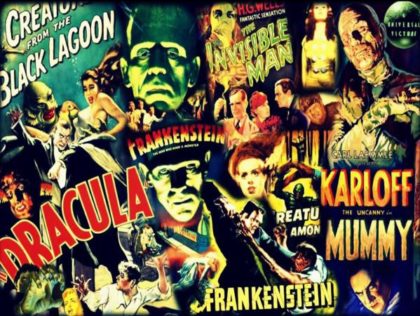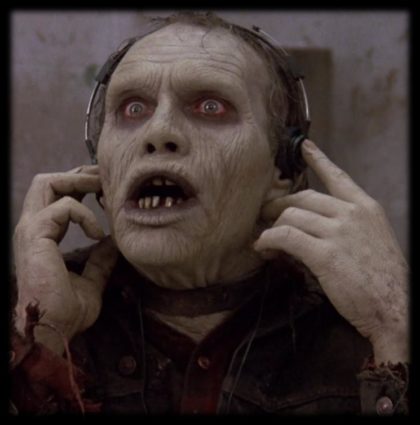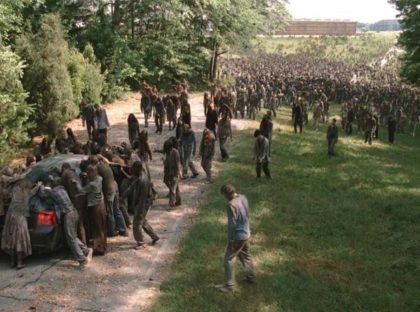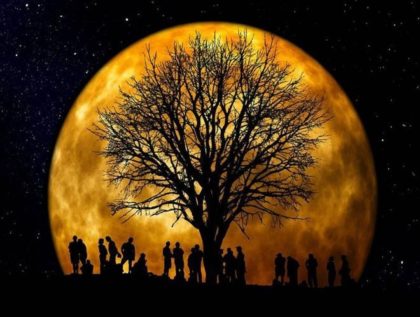Theology of The Walking Dead
Unitarian Universalist Congregation of Columbia January 28, 2018
Rev. Jeff Liebmann
Opening Words
by Philo (20 B.C.E. to 50 C.E.) from On the Virtues
Even the great king will appear as the poorest of men if compared with a single virtue. For his wealth is soulless, buried deep in store-houses and recesses of the earth, but the wealth of virtue lies in the sovereign part of the soul, and the purest part of existence.
Time for All Ages
Under the Bed
One night, a boy named Tommy was just about to fall asleep when he heard a noise from under his bed. He yelled for his mother, who ran into the room and turned on the light.
“There’s a monster under my bed!” he said.
“Tommy,” his mother replied, “there is no such thing as monsters.” She went over and lifted the covers and looked under the bed. “There is nothing there, Tommy. You were probably just dreaming. Now go to sleep.”
Tommy lay there in the dark again. Suddenly, he heard the sound
again, sort of like heavy breathing coming from under his bed. He slowly gathered his courage, got out of bed, and looked under the covers.
Under the bed was a monster! He big and covered with thick yellow fur and purple polka dots. And he was crying.
Tommy asked, “What’s wrong? Why are you crying?”
The shivering monster looked at Tommy and said, “My name Beeble. I got lost and can’t find my way home in the dark. I came in here to get warm.”
“Why didn’t my Mom see you?” asked Tommy. “Adults can’t see monsters like me,” Beeble replied.
“Well,” Tommy said, “why don’t you sleep here tonight and I’ll help you find your way home tomorrow.
The next morning, Tommy told his mother that he was going to explore in the woods. He filled a backpack with peanut butter and jelly sandwiches and some apples and he and Beeble started off into the woods. Beeble quickly gobbled down the food.
“I’m sorry,” he said stuffing his big mouth full of food. “But I haven’t eaten in hours and I’m starving.”
The two wandered through the woods until Beeble finally recognized some rocks.
Excited, he said, “This is it! My cave is right around this hill!” When they got to the
cave, Beeble invited Tommy in. He offered to share some of his spiders and grubs, but Tommy politely declined.
Saying goodbye, Tommy made his way home just in time for dinner. His mother was surprised when he went to bed early, tired from his big adventure.
A few hours later, when the house was dark and quiet, Tommy heard a noise from under his bed. He got out of bed and looked underneath and saw a monster! Only it wasn’t Beeble. This monster was skinny, and gray all over with four long arms and one big eye. A tear rolled out of the eye.
“What are you doing here?” asked Tommy.
“My name is Bungro. My friend Beeble told me that if I ever get lost that I should come here for help.”
From that night on, Tommy met all kinds of monsters. Blue ones and orange ones. Tall and short ones. Thin and wide ones. And he helped each of them find their way home.
Reflection Reading
Letter to Georg Brandes (17 February 1871), as translated in Henrik Ibsen : Björnstjerne Björnson, Critical Studies (1899) by Georg Morris Cohen Brandes
He who possesses liberty otherwise than as an aspiration possesses it soulless, dead. One of the qualities of liberty is that, as long as it is being striven after, it goes on expanding. Therefore, the man who stands still in the midst of the struggle and says, “I have it,” shows by so doing that he has just lost it.
 Now this very contentedness in the possession of a dead liberty is characteristic of the so-called State, and, as I have said, it is not a good characteristic.
Now this very contentedness in the possession of a dead liberty is characteristic of the so-called State, and, as I have said, it is not a good characteristic.
No doubt the franchise, self-taxation, etc., are benefits – but to whom? To the citizen, not to the individual. Now, reason does not imperatively demand that the individual should be a citizen. Far from it…
Away with the State! I will take part in that revolution. Undermine the whole conception of a State, declare free choice and spiritual kinship to be the only all-important conditions of any union, and you will have the commencement of a liberty that is worth something. Changes in forms of government are pettifogging affairs – a degree less or a degree more, mere foolishness.
The State has its root in time, and will ripe and rot in time. Greater things than it will fall – religion, for example. Neither moral conceptions nor art-forms have an eternity before them. How much are we really in duty bound to pin our faith to? Who will guarantee me that on Jupiter two and two do not make five?
Sermon – Theology of The Walking Dead
For those of you not plugged into this particular sphere of popular culture, The Walking Dead has been a #1 rated show on television in recent years. Normally, I would put little stock in such a statistic as it reflects on the general state of our society. This time, however, I think the popularity of this series does indeed inform us about some trends we face – trends we should probably monitor and even act upon. For, unlike many other top-rated fare, The Walking Dead presents some deep-rooted theological issues for us to consider.
Tales of myths and monsters have always had an element of religion, of other- worldliness. But, in ancient times, the monsters were nearly always from some other place, some other time, even some other plane of existence. The Titans; demons and demi-urges; pixies, nixies, and fairies; dragons and unicorns; each was created by the gods, derived from an unknown world, or resided in the nether regions of the night or the afterlife.
worldliness. But, in ancient times, the monsters were nearly always from some other place, some other time, even some other plane of existence. The Titans; demons and demi-urges; pixies, nixies, and fairies; dragons and unicorns; each was created by the gods, derived from an unknown world, or resided in the nether regions of the night or the afterlife.
Ever since the modern-day horror genre began with the now classic creatures, such as Frankenstein’s Monster, Dracula, the Wolfman, and others, the horror antagonists have been much more recognizably human. Frankenstein’s Monster is made from reanimated human body parts. Dracula is an undead human, and the Wolfman is a transformed human suffering from the disease of lycanthropy.
Even the relative newcomer, the walking dead, has undergone changes. The
ghoul exists from ancient times – a monster that lives in graveyards and consumes the bodies of the dead. The traditional zombie, of voodoo mythology however is all human being, enchanted by magic to do the bidding of the spell’s caster.
And each of the creatures in the pantheon of horror stories presents its own theological conundrums. Is it right for humans to attempt to create life – a task normally left only to god? Is a creature who feeds off other humans in order to evolve into a more powerful being simply our next evolutionary stage? Can the id be manifested in physical form, released from its human conscience to wreak havoc and reign down destruction?
In the early days of Hollywood, the zombie was actually quite harmless. More a boogeyman warning of the fate to befall the wicked, the zombie did not generally kill other humans of its own volition. The zombie was simply a thoughtless, animated body. But, when Director George Romero combined the ancient ghoul with the modern zombie to create the Living Dead, the game changed completely
In his Living Dead franchise of movies, Romero created a truly universal
monster, reanimated dead flesh like Frankenstein’s creation, undead like the vampire, and carnivorous like the lycanthrope. And unique in his film treatments, the Living Dead eventually begin to regain rudimentary instincts, thoughts, even basic human emotions.
Another tremendous accomplishment of Romero’s movies is that the Living Dead have evolved from gruesome consumers of innocent flesh to the victims of human brutality. Through subtle introductions of identity, the development of mental faculties, and the uniting of the Living Dead into coordinated action, Romero has masterfully made his creature sympathetic.
The truly great monsters of filmland succeed because they generate a degree of sympathy from the audience. Moby Dick. King Kong. Godzilla. Viewers might even find themselves cheering for the monster, as the human protagonists exhibit their tendencies toward cruelty, heartlessness, crimes against nature, and selfishness.
These monsters have an inhuman “otherness.” Rarely has the sympathetic monster been a creature with which the audience could identify on more than an emotional level. Perhaps the Hunchback of Notre Dame, or even the original Mummy.
 Today’s Living Dead, however, are at times not only sympathetic, but they are us. They are us. Whether they are shamblers or runners, truly dead or just infected, generically speaking, with the modern zombie we are equally scared and empathetic because they are us.
Today’s Living Dead, however, are at times not only sympathetic, but they are us. They are us. Whether they are shamblers or runners, truly dead or just infected, generically speaking, with the modern zombie we are equally scared and empathetic because they are us.
So, from a theological standpoint, a story like The Walking Dead is not the Book of Revelations. Despite its apparent post- apocalyptic hopelessness, the few remaining humans are not battling hellspawn, or aliens, or mutations. These are their children, neighbors, co-workers – and they want to eat you.
So, what do you do? Are you theologically justified in “killing” a “person” who is dead by our standard of life, but is still mobile and still pursuing a survival instinct? This raises the always troubling definition of what Unitarian Universalists mean when we say we believe in the inherent worth and dignity of every person. What exactly constitutes a person? Human DNA? Mobility?
Purpose? Mortality (in the sense that a Walking Dead can be permanently “killed”)?
Those of you who watch the show might remember Season Two. Just in case any of you decide to sit through a marathon session to catch up, take my advice and skip Season Two. It is a real yawner if you watch straight up action. But important theological points are raised in that season.
The main cast of characters from the first season take refuge in a large, mysteriously isolated farm owned by a veterinarian named Herschel. After much soap opera melodrama, they find that the locked barn is filled with walkers, some of whom are Herschel’s family and friends. Herschel refuses to give up on the idea that the walkers can be “cured” and brought back to full humanity. As is usually the result in this show, eventually everything goes to hell; the barn is burned and the walkers scatter the cast.
The second interesting occurrence (and this is major plot spoiler alert, so close your ears for the next two minutes if you really intend to wade through all eight seasons), happens when two of the group go to a nearby medical facility for supplies. Of course, things go awry and the pair is running for their lives, hopelessly outnumbered. Well, as the old joke goes, when two hunters consider being chased by a bear, the one hunter talks about outrunning the bear. The other hunter replies that he only has to outrun his companion. The one character shoots the other in the leg, and runs to safety as the horde descends on the now prone partner.
These two events pose theological challenges worthy of consideration, especially given the lack of knowledge regarding the cause of the zombie pandemic. Viewers only know that a mysterious virus infected all of humanity and that upon death, the virus somehow reanimates the body into a single-minded, slavering, consumer of human flesh – the bite from which being the other way the symptoms of the disease are hastened.
I am sure that some nerd out there knows exactly how many walkers have been killed on the show, but let us say it is an extremely large number. Nearly every character kills without prejudice and generally with little or no consideration regarding the walker’s inherent worth or dignity.
Since the Centers for Disease Control blew up at the end of Season One, the viewer is led to believe that no one remains working to cure the virus. But the characters cannot know for sure. And on several occasions, groups of humans have created impregnable fortresses that have kept out the zombie hordes. These safe zones are invariably destroyed, however, not by the walkers, but by other humans with nefarious motives.
Which brings us to the moral dilemma. If the Walking Dead could be contained, or their imminent threat eliminated, would the remaining humans have any justification in killing them? The answer, of course, lies in whether the remaining humans could work together cooperatively to maintain such a haven, which has ended disastrously every time it has been tried during the series. And while the shortage of supplies and an outbreak of influenza have contributed, the havens created for human survival are ultimately always destroyed because the humans simply could not work together.
 So, while the Walking Dead roam the planet, sometimes virtually in armies, with complete unity of purpose and coordinated direction, the remaining humans continue to beat, murder, imprison, and torture each other, leading desperate lives of day-to-day survival in the most inhospitable environment imaginable. Walkers have been slaughtered quite creatively with every tool at hand, from firearms and flames, to samurai swords and scythes, and crowbars and crossbows. At this point, the penalty for endangering the lives of others – whether walker or human –has become capital punishment.
So, while the Walking Dead roam the planet, sometimes virtually in armies, with complete unity of purpose and coordinated direction, the remaining humans continue to beat, murder, imprison, and torture each other, leading desperate lives of day-to-day survival in the most inhospitable environment imaginable. Walkers have been slaughtered quite creatively with every tool at hand, from firearms and flames, to samurai swords and scythes, and crowbars and crossbows. At this point, the penalty for endangering the lives of others – whether walker or human –has become capital punishment.
So, one must wonder, from a theological standpoint, is this the fate of humanity? In The Walking Dead world, god has vacated, hope has dwindled to a flickering flame, and even an Episcopal priest (introduced in season 5) condemned his whole congregations to annihilation at the beginning of the outbreak when he locked them out of the church. When faced with seemingly insurmountable odds to survive, are we destined to kill each other, whether for supplies, safety, or just plain revenge? When faced with the choice between cooperation and self-preservation, is the latter destined to win out?
These are not trivial or academic questions. We have all lived through the threat of the end of the world, whether from mutually assured destruction policies, any number of diseases from mad cows to flu-carrying birds to the dreaded ebola, and from our own toxic creations of radiation, carbon monoxide, genetically altered foods, or resource mismanagement. In the end, what makes us any different, any better than the zombies bent on killing us?
Ironically, the English word “soul” is first attributed in the 8th century tale of Beowulf, the hero who kills the monster Grendel. The term means many things to many people. Some of our largest Unitarian Universalist churches (in Tulsa, Washington, New York City, Indianapolis, among others) are named All Souls. So, in the context of Unitarian Universalism as a liberal religion, can we find common ground to define the notion of soul and in this way differentiate us as persons with souls from the monsters who look like us but are soulless.
In his book, On Being Human Religiously, renowned Unitarian scholar James Luther Adams, describes the Five Smooth Stones of Liberalism.
- Religious liberalism first depends on the principle that revelation is continuous. For the Walking
 Dead, their purpose is singular and unchanging, whatever the circumstances. For the human survivors – no matter how badly they behave – every time they emerge from peril, meaning has been revealed in some
Dead, their purpose is singular and unchanging, whatever the circumstances. For the human survivors – no matter how badly they behave – every time they emerge from peril, meaning has been revealed in some - All relations between persons ought to ideally rest on mutual, free consent and not on coercion. The Walking Dead are not free to rid themselves of the viral drive to consume human flesh. But the humans– at least when they are not intent on killing each other – can succeed in creating community when they work cooperatively.
- Religious liberalism affirms the moral obligation to direct one’s efforts toward the establishment of ajust and moving community. The Walking Dead may tend to congregate in groups, but they do not act in concert as a group. Each is driven solely by their own individual desire to feed, not by improving the circumstances of afflicted companions. Vastly outnumbered, the humans cannot possibly survive without selfless acts, living by a code of rules in a new world, and by constantly moving and adapting to changing circumstances.
- Goodness derives only from our own institutional efforts. As communal creatures, we must express faith in social forms through the organization of power in order to create freedom and justice. The Walking Dead have no kind of moral code and no future goal for group preservation or growth. The humans, on the other hand, keep trying (albeit unsuccessfully) to use their energies to do the right
- Lastly, at the core of liberal religion is an attitude of ultimate optimism. The Walking Dead have no hopes or dreams. They simply wander, consume, and eventually rot or are destroyed. The human survivors keep looking for sanctuary, for solutions, for an organization upon which progress can occur. Without this sense of hope, they would simply kill themselves given the enormous odds they face.
I believe this is the essence of soul. We believe in ongoing learning and growth.
We believe in the free search for truth and meaning. We must care not only for ourselves, but for our brothers and sisters. We define our own sense of right and wrong rather than accepting blindly the moral code of others. And we believe that, in the end, things will always get better.
 And when we fail, when we close our minds, try to exert power over others, become selfish, adhere rigidly to tired dogma, or see life pessimistically, then we simply become soulless zombies.
And when we fail, when we close our minds, try to exert power over others, become selfish, adhere rigidly to tired dogma, or see life pessimistically, then we simply become soulless zombies.
The song that Anna sang earlier was written about the 1993 IRA bombing in Warrington, in memory of two young victims, Johnathan Ball and Tim Parry. The song bemoans the prolonged conflict between England and Northern Ireland that epitomizes this soullessness. A day never fails to end without another reminder of soullessness in our world.
The soul is not a static thing, a will-of-the-wisp evanescence of smoke that floats within our bodies and dissipates away when we die. Our souls are what we think and feel and do in response to the world. So long as we grow from our experiences, we have a soul. So long as we respect and empower each other, we have a soul. So long as we strive toward a world of peace, liberty and justice for all, we have a soul. So long as we work with commitment and our best intentions, we have a soul. And so long as we keep the lamp of hope lit within us, it warms and feeds our soul.
Prayerful Reflection
Spirit of life and love that we know by many names, be with us as we enter an attitude of reflection, meditation, and prayer.
The tapestry of civilization is woven with fragile thread. The slightest break or unraveling of that thread can lead to disaster.
But people of soul are the weavers who repair the damage and expand that tapestry of equality and justice until it covers the world. People of soul are the web that establish and sustain goodness and hope for a world weary from war, poverty, tyranny, and hatred.
May you leave this sanctuary this morning with your soul’s flame rekindled, ready to take to the loom once again.
Blessed be. Amen. Let it be so.

Closing Words
from The Prophet by Kahlil Gibran
Say not, “I have found the truth,” but rather, “I have found a truth.” Say not, “I have found the path of the soul.” Say rather, “I have met the soul walking upon my path.” For the soul walks upon all paths. The soul walks not upon a line, neither does it grow like a reed. The soul unfolds itself, like a lotus of countless petals.

 Dead, their purpose is singular and unchanging, whatever the circumstances. For the human survivors – no matter how badly they behave – every time they emerge from peril, meaning has been revealed in some
Dead, their purpose is singular and unchanging, whatever the circumstances. For the human survivors – no matter how badly they behave – every time they emerge from peril, meaning has been revealed in some